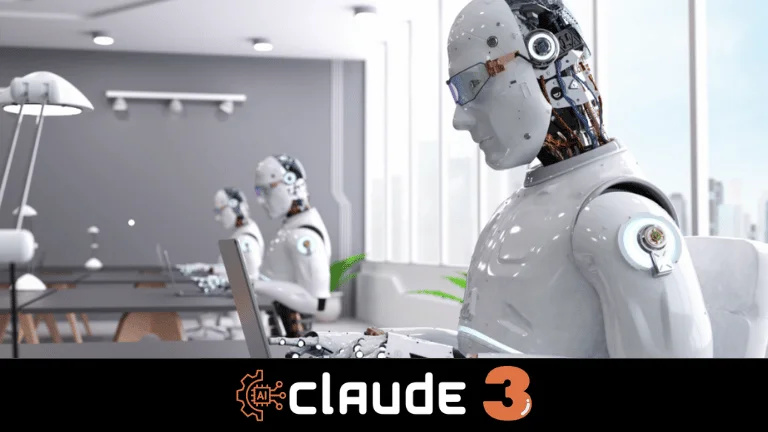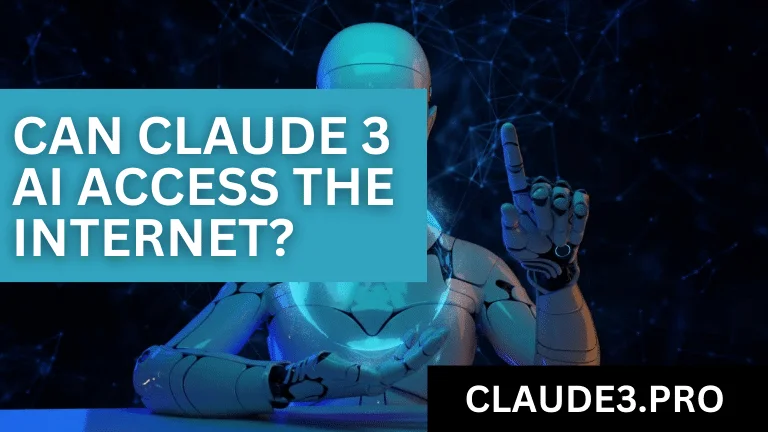Can Claude 3 AI Access the Internet? few questions spark as much curiosity and debate as the capabilities of advanced AI systems. Among these, Claude 3 AI has emerged as a topic of intense interest, particularly regarding its ability to access the internet. This seemingly simple question opens up a Pandora’s box of technological, ethical, and practical considerations that are reshaping our understanding of AI’s role in our digital world.
As we dive into this exploration, we’ll uncover the intricacies of Claude 3 AI’s design, its current capabilities, and the implications of potential internet access for such an advanced system. Whether you’re a tech enthusiast, an AI researcher, or simply someone intrigued by the future of technology, this journey through the world of Claude 3 AI promises to be both enlightening and thought-provoking.
Join us as we unravel the mystery surrounding Claude 3 AI’s relationship with the internet, and discover what this means for the future of AI and our digital interactions.
Understanding Claude 3 AI: A Brief Overview
Before we can delve into the question of internet access, it’s crucial to understand what Claude 3 AI is and how it functions. Claude 3 AI represents the cutting edge of language models and artificial intelligence, designed to process and generate human-like text with unprecedented accuracy and contextual understanding.
The Foundation of Claude 3 AI
At its core, Claude 3 AI is built on advanced neural network architectures, leveraging deep learning techniques to understand and generate language. This foundation allows Claude to:
- Process and comprehend complex queries and instructions
- Generate coherent and contextually appropriate responses
- Engage in nuanced conversations on a wide range of topics
Training and Knowledge Base
One of the key aspects that sets Claude 3 AI apart is its extensive training data and knowledge base. During its development, Claude was exposed to vast amounts of text data, covering a wide range of subjects. This training allows Claude to:
- Possess a broad understanding of various topics
- Make connections between different areas of knowledge
- Provide informed responses based on its training data
However, it’s important to note that this knowledge base is static, meaning it doesn’t update in real-time with new information from the internet.
Offline vs. Online AI Models
To understand Claude 3 AI’s capabilities, it’s crucial to distinguish between offline and online AI models:
- Offline models, like Claude 3 AI, operate based on their pre-existing knowledge base without real-time updates.
- Online models have the ability to access and incorporate new information from the internet in real-time.
This distinction is at the heart of our question about Claude 3 AI’s internet access capabilities.
The Current State: Claude 3 AI and Internet Access
Now that we have a foundational understanding of Claude 3 AI, let’s address the central question: Can Claude 3 AI access the internet?
The Short Answer: No Direct Internet Access
As of its current iteration, Claude 3 AI does not have direct, real-time access to the internet. This means that Claude cannot:
- Browse the web in real-time
- Fetch current news or information
- Access live databases or streaming services
Implications of Offline Operation
The offline nature of Claude 3 AI has several important implications:
- Static Knowledge Base: Claude’s knowledge is based on its training data, which has a cutoff date. It doesn’t have information about events or developments after this date.
- Consistency in Responses: Without real-time updates, Claude’s responses remain consistent over time, which can be beneficial for certain applications.
- Privacy and Security: The lack of internet access means that Claude cannot access or share personal or sensitive information online.
The Strength of Pre-trained Knowledge
While the inability to access the internet might seem like a limitation, it’s important to recognize the strengths of Claude’s pre-trained knowledge:
- Vast Information Repository: Claude’s training data encompasses an enormous amount of information, allowing it to provide insights on a wide range of topics.
- Rapid Response: Without the need to search the internet, Claude can provide instant responses based on its existing knowledge.
- Offline Reliability: Claude can operate effectively in environments without internet connectivity.
The Technology Behind Claude 3 AI’s Information Processing
Understanding how Claude 3 AI processes information provides insight into why it doesn’t currently access the internet and how it manages to be so effective without real-time data.
Neural Network Architecture
Claude 3 AI is built on a sophisticated neural network architecture that allows for complex language understanding and generation. This architecture includes:
- Attention Mechanisms: Enabling the model to focus on relevant parts of input text
- Transformer Layers: Processing information in parallel, allowing for faster and more efficient computation
- Large Parameter Count: Storing vast amounts of information within the model’s weights
Natural Language Processing Capabilities
Claude’s advanced natural language processing (NLP) capabilities are key to its effectiveness. These include:
- Contextual Understanding: Grasping the nuances and context of language
- Sentiment Analysis: Detecting and interpreting emotions in text
- Entity Recognition: Identifying and categorizing named entities in text
- Language Generation: Producing coherent and contextually appropriate text
Information Retrieval and Synthesis
While Claude can’t access new information from the internet, it excels at retrieving and synthesizing information from its training data:
- Rapid Information Retrieval: Quickly accessing relevant information from its vast knowledge base
- Cross-referencing: Making connections between different pieces of information
- Inference: Drawing conclusions based on available information
Limitations of Static Knowledge
It’s important to acknowledge the limitations of Claude’s static knowledge base:
- Temporal Limitations: Information may become outdated, especially for rapidly changing fields
- Lack of Real-time Data: Unable to provide information on current events or real-time data
- Potential for Outdated or Incorrect Information: If the training data contained errors or biases, these could be reflected in Claude’s responses
The Ethical and Practical Considerations of AI Internet Access
The question of whether Claude 3 AI should have internet access is not just a technical one, but also an ethical and practical consideration. Let’s explore some of the key factors in this debate.
Potential Benefits of Internet Access
If Claude 3 AI were to gain internet access, it could potentially:
- Provide Up-to-Date Information: Access to current news, research, and data would enhance its ability to provide timely insights.
- Offer Real-Time Assistance: It could help with tasks requiring current information, like weather forecasts or stock prices.
- Continuous Learning: The AI could potentially update its knowledge base in real-time, constantly improving its capabilities.
Ethical Concerns and Risks
However, granting internet access to an advanced AI system like Claude 3 raises several ethical concerns:
- Privacy Issues: How would the AI handle sensitive or personal information it encounters online?
- Misinformation Spread: Without proper safeguards, the AI could potentially spread or amplify false information.
- Autonomy and Control: There are concerns about the level of autonomy an internet-connected AI should have.
Practical Challenges
Implementing internet access for Claude 3 AI would also face several practical challenges:
- Data Filtering: Developing systems to filter and verify the vast amount of information on the internet.
- Real-Time Processing: Enhancing the AI’s ability to process and incorporate new information quickly.
- Maintaining Consistency: Ensuring that the AI’s responses remain consistent and reliable even with changing information.
The Balance of Innovation and Responsibility
The debate around AI internet access highlights the need to balance technological innovation with ethical responsibility. As AI systems become more advanced, it’s crucial to consider:
- Transparency: Being clear about the AI’s capabilities and limitations
- Accountability: Establishing frameworks for responsible AI development and deployment
- User Trust: Maintaining user trust by ensuring the AI’s responses are reliable and ethical
The Future Possibilities: Claude 3 AI and Internet Connectivity
While Claude 3 AI currently operates without internet access, the future holds intriguing possibilities for how advanced AI systems might interact with the online world. Let’s explore some potential scenarios and their implications.
Selective Internet Access
One possible future development could be granting Claude 3 AI selective internet access:
- Controlled Information Sources: Allowing access only to verified, high-quality information sources
- Task-Specific Access: Enabling internet connectivity for specific tasks or queries that require current data
- User-Initiated Searches: Allowing users to request internet searches for up-to-date information
Real-Time Learning and Adaptation
Advanced AI systems of the future might be able to learn and adapt in real-time based on internet data:
- Continuous Model Updates: Regularly updating the AI’s knowledge base with new information
- Adaptive Responses: Tailoring responses based on current trends and information
- Dynamic Knowledge Integration: Seamlessly incorporating new knowledge into existing understanding
Enhanced Multimodal Capabilities
Future iterations of AI like Claude 3 might integrate internet access with advanced multimodal capabilities:
- Visual Information Processing: Analyzing and describing images or videos from the internet
- Audio Processing: Transcribing and analyzing audio content from online sources
- Cross-Modal Understanding: Integrating information from various online media types
Collaborative AI Systems
We might see the development of collaborative AI systems that combine the strengths of different models:
- Offline-Online Hybrid Models: Combining the consistency of offline models with the real-time capabilities of online models
- AI Ensembles: Multiple AI systems working together, some with internet access and others without, to provide comprehensive and balanced responses
Ethical AI Frameworks
As AI systems potentially gain more direct internet access, we’ll likely see the development of robust ethical frameworks:
- Transparency Protocols: Clear guidelines on when and how AI accesses online information
- Bias Detection and Mitigation: Advanced systems to identify and correct biases in online information
- User Control and Consent: Giving users more control over when and how AI accesses the internet on their behalf
Conclusion
As we’ve explored the question “Can Claude 3 AI Access the Internet?”, we’ve uncovered a complex landscape of technological capabilities, ethical considerations, and future possibilities. While the current iteration of Claude 3 AI operates without direct internet access, the potential for AI systems to interact with the online world in the future is both exciting and challenging.
The journey of AI development, exemplified by systems like Claude 3, reminds us of the importance of balancing innovation with responsibility. As we continue to push the boundaries of what’s possible in artificial intelligence, we must remain mindful of the implications of our technological advancements.
Whether future versions of Claude or similar AI systems gain internet access or not, one thing is clear: the evolution of AI will continue to shape our digital interactions, our access to information, and our understanding of intelligence itself. As we move forward, it’s crucial that we approach these developments with a blend of enthusiasm for the possibilities and a commitment to ethical, responsible innovation.

